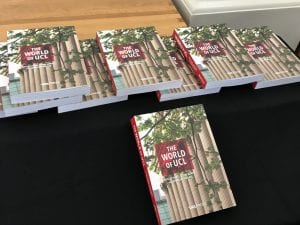Open Science at Utrecht University – Erasmus staff exchange
By ucyldva, on 10 July 2018
I recently visited Utrecht University as part of an Erasmus Exchange exploring Open Science. The exchange was attended by staff working in libraries across Europe including Croatia, Finland, Malta, Austria, France and Latvia. The exchange focused on Open Science support being delivered by Utrecht University as part of a national plan for open science.
Open Science in the Netherlands
The programme was introduced in the context of ambitious plans in the Netherlands to pursue Open Science launched in a ‘National Plan open Science‘ launched in February 2017.
This plan includes focuses on three key areas;
- open access to publications which includes the ambitious aim ‘that publicly-funded scientific publications must be accessible to all by 2020’
- Making research data optimally available for reuse
- Recognition and rewards for researchers.
Open Science at Utrecht University
Utrecht University has developed local plans with the library playing a key role in supporting open science. The library spent time meeting with researchers to discuss how open science could be implemented within the university. This ensured researchers could outline their concerns and their own visions of open science. The chair of the project to implement the project is a researcher and will be supported by library colleagues. The library believed that this strategy of in-depth engagement which included meeting with 45 researchers/groups ensured that there was true buy-in from the research community when the project was launched.
The library has taken a distributed approach to work on Open Science with staff across the library taking ownership of particular areas of open science support. This approach has allowed the library to have a bigger impact than could be achieved by limiting open science support to one team and has made a broader range of support services possible.
Areas of Open Science support
The schedule during the week included sessions on a range of topics:
Open access
This session introduced the work being done within the university and in particular focused on the coordinated work being carried out by Dutch universities to negotiate national deals with publishers for Hybrid Journals. These deals mean that researchers are able to publish without paying APCs themselves. Some publishers have helped this process by introducing workflows that make it easy for researchers to understand that they do not need to pay for an APC whilst also reducing the workload for the library in processing APCs.
The library also funds APCs for full Open Access journals but has set a maximum APC of a 100 Euros. This approach – similar to that of other funding bodies including the Austrian Science Foundation – is intended to positively impact the market for APCs and push down the price. This type of policy was the topic of my Master’s dissertation so it was nice to revisit the topic and see how these approaches are currently being pursued by university libraries.
Research Data Management support
Utrecht University has a policy on Research Data similar to that of UCL. Alongside helping develop and advocate for this policy the library provides training and support across the research data lifecycle including Data Management Planning and the publication of Research Data through various repositories. A recent project by the library to build a pool of Data Managers based in the library but working on projects within the university was a particularly interesting approach to delivering practical support to projects in a sustainable way. This allows smaller projects who would struggle to hire a data manager themselves to get access to support as part of a funded project and also ensures that knowledge about systems, processes and policies are not lost at the end of a project when temporary staff leave.
Data Storage infrastructure at University of Utrecht and Research IT services
Utrecht University has also worked to develop IT Services to support research. This is still a relatively new area of support but has already resulted in some impressive projects. This includes YODA a platform that allows researchers to store, manage and share data on one platform. It leverages iRODS a data management technology which allows researchers or data managers to set rules for how data will be managed. YODA includes options to take snapshots to be archived at particular points in the project, options to share data with collaborators with a range of access permissions and to publish metadata or the full data through a repository. A major advantage of the platform is that it is also suitable for holding sensitive data. This means researchers don’t need to engage with different systems when they are working on projects that contain sensitive data and they can also easily publish metadata only records of projects to allow other researchers to request access to this data.
Digital Humanities support, Open Education Repository and other experiments by the library
The library is also experimenting in a number of other areas related to open science. This includes providing support for digital humanities projects, particularly by providing legal advice for text mining projects and facilitating access to materials. The library is currently launching an open education repository to support the dissemination of potentially reusable teaching materials. Utrecht University Library is also in the process of becoming an early example of a library without a catalogue. Instead, they have moved their collections to WorldCat this approach was taken in recognition of the fact that most researchers and students won’t necessarily begin searching for information through a university library catalogue.
Lessons learned
Attending this Erasmus Staff Exchange was a valuable learning experience, particularly in helping me think about how to link the Research Data Management support within the library to open science. Some of the lessons picked up on the exchange will feed into a course I run on open science and open notebooks. The approach of developing a programme for a group of visitors meant that experiences of supporting open science could be exchanged between participants and it was particularly interesting to learn about how open science was being approached across different insitutions accross Europe. I hope that the Erasmus Exchange will continue to be available to people based in UK universities in the future and would encourage anyone interested to apply to the scheme. If you have questions about how it works I would be happy to answer them.
 Close
Close












